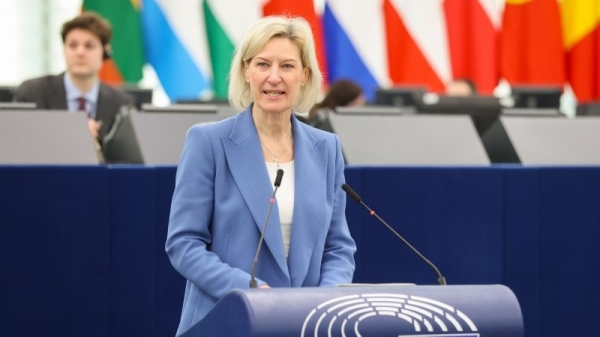EPP launches last-minute attack on EU corporate due diligence law

Right-wing MEPs have tried to topple a compromise deal on the EU’s Corporate Sustainability Due Diligence Directive ahead of a crucial European Parliament vote on Thursday (1 June).
The due diligence law, first proposed by the European Commission in February 2022, aims at making large EU companies accountable for violations of human rights and environmental standards in their value chains.
While EU governments have already agreed a common position on the file last December, the European Parliament is yet to agree its own position before before final “trilogue” talks can begin with the EU Commission to complete the law’s adoption.
After intense negotiations, the Parliament’s justice committee voted its position on 25 April with a large majority. All members of the centre-right European People’s Party (EPP) voted in favour of the text at the time.
But in the meantime, things have changed.
On Wednesday (31 May), the EPP decided that it would vote down the Parliament’s position on the CSDDD in Thursday’s plenary session unless an amendment to the text is included.
The amendment, tabled by German conservative MEP Angelika Niebler, would mandate the European Commission to convert the directive into a regulation six years after its implementation.
The difference between a directive and a regulation is that directives have to be implemented into national law by the member states, giving them some leeway to adapt it to national circumstances, while a regulation is directly applicable.
The EPP backers of the amendment argue that further harmonisation is needed across the EU to reduce the administrative burden for companies.
However, such an amendment is unlikely to survive negotiations with EU member states.
The pushback by the EPP comes after EU leaders like France’s Emmanuel Macron and Belgium’s Alexander De Croo have called for a “European regulatory break” to lessen the administrative burden on EU companies.
Some business associations have also pushed back quite heavily on the directive. Thilo Brodtmann, executive director of VDMA, a German business association, called on the Parliament “to pull the emergency break” on the CSDDD.
As multiple sources confirmed to EURACTIV, the EPP opposition was led by the German Christian Democrats even though Axel Voss, the EPP shadow rapporteur on the CSDDD file who negotiated and supported the deal, is a German Christian Democrat himself.
“It is a difficult situation for him,” Axel Voss’ office told EURACTIV, saying it was not yet clear how Voss would vote on Thursday.
During the parliamentary debate on Wednesday, he did not get much more specific than that, praising the compromises that were reached while also regretting that the directive would not lead to enough harmonisation across the EU.
MEP Niebler, meanwhile, defended the EPP’s decision. “It is normal that party groups and individual [MEPs] submit amendments,” she said.
The other side of the Parliament, however, was not amused. “Political games is really not where we should be now,” said Lara Wolters, the main rapporteur of the file who belongs to the Socialists and Democrats (S&D) group.
Campaigners were also up in arms. “It’s a toxic game to prioritise short-term political gains in a pre-election year over the long-term wellbeing of our environment and respect for human rights”, said Uku Lilleväli, the WWF’s sustainable finance policy officer.
Luckily for the NGOs, the German Christian Democrats could not convince the entire EPP, which means that an important minority the group’s lawmakers will likely vote in favour of the CSDDD text as it was passed in the justice committee, ignoring the party’s majority decision.
Together with the Left group, the Social Democrats, the Greens, and a large majority of the centrist Renew group, the text is likely to pass on Thursday.
Read more with EURACTIV




